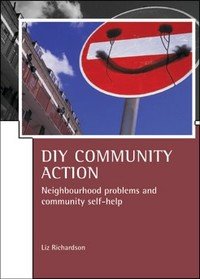How people can be persuaded to take more control of their own lives continues to be a subject of policy and academic debate, and the contribution of active citizens to improving societal well-being is high across different policy agendas. But the promotion of community self-help raises a wide range of questions - for people working in neighbourhoods, for policy makers, for politicians, and for residents themselves - about how we promote engagement, what would motivate people to become active, and more fundamentally about the ongoing relevance and value of community activity. DIY Community Action offers thought-provoking answers to these questions, based on detailed real-life evidence from over 100 community groups, each trying to combat neighbourhood problems. It presents a lively challenge to the existing thinking on contested debates, and proposes ways forward for community building. This timely publication is an engaging resource for policy makers, practitioners, academics, students and general readers interested in exploring community engagement and active citizenship. Its insightful analysis will be of interest to students of social policy, sociology, community work, housing and regeneration, local government studies and public policy.

